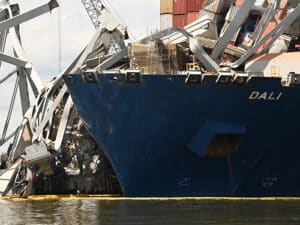
World’s largest bio-LNG plant to be built in Amsterdam
Written by Nick Blenkey
The bio_LNG plant will be located adjacent to Titan’s berth in the Port of Amsterdam, from which the land will be leased.
Bio-LNG (or liquefied biomethane) is widely seen as key to “extending the runway” for existing LNG-fueled tonnage to meet tightening GHG-reduction targets. To help meet the growing demand for the fuel, Amsterdam-headquartered Titan (formerly Titan LNG) is to build the world’s largest liquefied biomethane (LBM) production plant.
Titan will build and operate the plant, capable of producing 200,000 tonnes of LBM annually, at its strategic location in the Port of Amsterdam, allowing it to supply ships and trucks.
BioValue, one of the largest biogas suppliers in the Netherlands, will supply a significant part of the biogas required for LBM production.
For this, BioValue will construct a new biogas plant, adjacent to the LBM plant, with a processing capacity starting at 300,000 tons of organic waste per year.
The remaining biogas will be sourced from other production installations throughout Europe that are connected to the existing gas grid.
Titan says this hybrid sourcing setup enables the scale required for impactful decarbonization of the marine industry.
Titan has selected Linde Engineering to perform the engineering based on Linde’s proprietary liquefaction technology.
The bulk of the LBM volumes produced by the plant will be supplied to LBM-powered vessels. The remaining volumes will be available for truck refueling stations and industrial customers.
The LBM will substitute for fossil fuels, avoiding about a million tonnes of CO2 equivalent emissions per year, equal to the annual emissions of about 25% of all diesel cars in the Netherlands.
The plant will be located adjacent to Titan’s berth in the Port of Amsterdam, from which the land will be leased. The first LBM production is expected in 2025.
Producing LBM in the most sustainable way is a key project target. Importantly, biogas will only be sourced from sustainable feedstocks that are compliant with the latest EU Renewable Energy Directive and that are International Sustainability and Carbon Certification (ISCC) certified.
Other sustainability features integrated in the plant include the capture and utilization of the biogenic CO2 side stream, this will enable future production of e-methane by combining the biogenic CO2 with green hydrogen.
For this, a connection to the hydrogen backbone planned in the Port of Amsterdam is envisaged.
Roon van Maanen, director energy & circular industry at the Port of Amsterdam, said: “Having the energy transition, circular economy and clean shipping at the core of our sustainability strategy, Port of Amsterdam welcomes the novel renewable fuel plant with full support. We want to reduce emissions in our port area and lead the way in the transition to a sustainable society. This plant, with its hydrogen-ready design, is a perfect example that fits seamlessly with our long-term strategy for the port.




